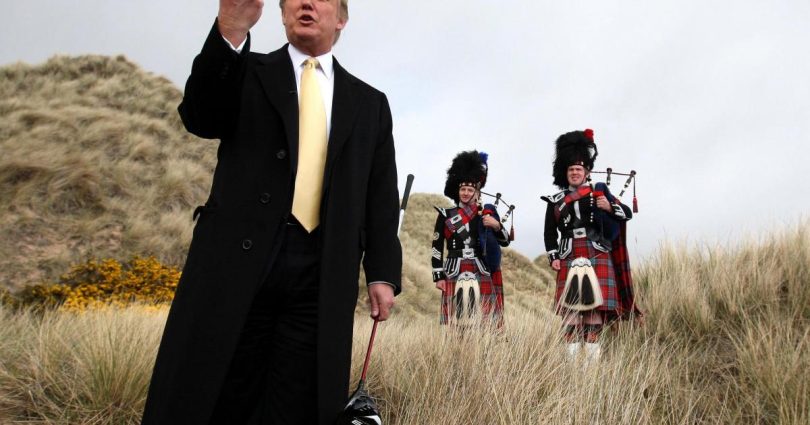There are certainly many people within Scottish tourism, golf and wider society who will find Mr Trump’s ownership of Turnberry, one of the country’s prized sporting and hospitality assets, and his hotel and golf resort on the Menie Estate hard to stomach.
The brand of populist politics he espouses, which seems expressly designed to sow outrage and division, means many people would simply not countenance a visit to any of his properties. No matter how popular the courses are within Scotland’s golfing community, or how impressive the quality of the hotels, the fact they are owned by Mr Trump will be a turn-off. Some people will not have forgotten the unedifying public battle that took place between the Trump organisation and Menie residents as he sought to progress his plans on land that opponents said had protected environmental status.
Mr Trump, of course, could not give two hoots about anyone who stands in the way of his developments. He will doubtless be of the firm belief that the investments made by his business have greatly enhanced the sporting and hospitality landscape of Scotland, and are better than anything else around.
And moreover, it would be categorically wrong to say that Mr Trump and his family’s resorts do not have their admirers. There are plenty of people in Scotland, perhaps including those with leanings to the political right, who like what they see as his non-nonsense, straight-taking approach. They may well like his apparent ability for doing a deal, and welcome the investment the Trump business group has made in Scotland.
Read more:
And there is certainly no shortage of golfers who like what Mr Trump has done with Turnberry, which continues to remain off The Open rota, despite recent representations by the President’s family. In an interview with The Herald’s Nick Rodger back in 2016, the golf course architect tasked with re-designing the fabled Aisla course, Martin Ebert, said the investment made by Mr Trump had saved its Open Championship future, highlighting the work undertaken to revive what had been a “fading jewel”. Mr Ebert was not to know, of course, that the R&A would announce five years later that The Open would not be returning to Turnberry while Mr Trump was associated with it, but the warm feelings towards the course remain. Leading US player Bryson DeChambeau expressed his support for The Open returning to the Aisla links just last week.
“I look at it as a golf course,” he said. “It’s one of the best golf courses in the world, and I’d love for it to be a part of the rotation. Albeit I haven’t played it, I’ve heard so many great things about it, and anytime you get to play a special historical golf course like that, I think it’s worthy of it for sure.”
A similar view may be held by golf fans old enough to remember the famous “Duel in the Sun” that took place at Turnberry in 1977, when Tom Watson and Jack Nicklaus went head-to-head for the Open title.
Equally, there appears to a lot of love in the golfing world for the Trump International Golf Links on the Menie Estate, which will host the Scottish Championship, a DP World Tour event, from August 7 to 10.
Beyond the golfing world, the Trump camp will likely proclaim that its investments have boosted the Scottish tourism offer more generally, and point to the jobs that are provided by the Ayrshire and [[Aberdeen]]shire resorts and the visitors they attract.
Granted, the look and feel of the Trump properties will not be attractive to everyone. But some will very much like the cut of their jib.
Marc Crothall, chief executive of the Scottish Tourism Alliance, said there is a case for separating the resorts from their ownership as he emphasised the importance of destinations like Turnberry to the overall tourism offer in Scotland. This would seem to be a pertinent point as the sector strives to keep international visitors coming to Scotland in an era when pressure from costs is making it difficult for hotel owners and other tourism businesses to re-invest in their properties.
“There is no doubt that Turnberry remains one of Scotland’s most iconic and internationally recognised golf resorts, and the quality of the product and experience it delivers has made a positive contribution to Scotland’s global tourism reputation,” Mr Crothall told The Herald. “As with any world-class tourism asset, for many visitors, the focus will be on the destination and the experience it offers rather than its owner.
“Continued investment in Scotland’s tourism product is vital, particularly in our rural economies; it supports jobs, skills, the local supply chain and brings significant benefits to those communities, while also maintaining Scotland’s competitive edge in the global luxury market.
“Turnberry is a prime example of how Scotland continues to attract global visitors seeking premium experiences rooted in heritage and sport, which showcase our world-renowned natural assets. Our growing reputation as a world-class golf destination is further strengthened by the development of other resorts, such as Trump International in Aberdeenshire, which has bolstered the north-east’s visitor economy.”
Mr Crothall added: “Scotland’s tourism industry aspires to achieve its national strategic ambition of being a world leader in 21st-century tourism, as outlined in the Scotland Outlook 2030 strategy. Investment is critical if this vision is to be realised, and it should be welcomed, whether from an independent owner-operator, a global organisation or the public sector; all investment is investment in Scotland’s wider tourism offering and both the national and local economy.”
Not everyone will agree with Mr Crothall. As we will perhaps see in the coming days if protestors turn up to ‘greet’ Mr Trump when he lands in Scotland, the President’s money will not be welcomed by all. But we can all agree that there will be no shortage of headlines, as usual, when the President comes to town.










